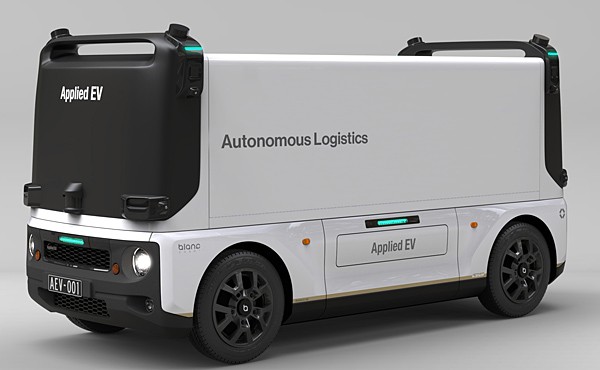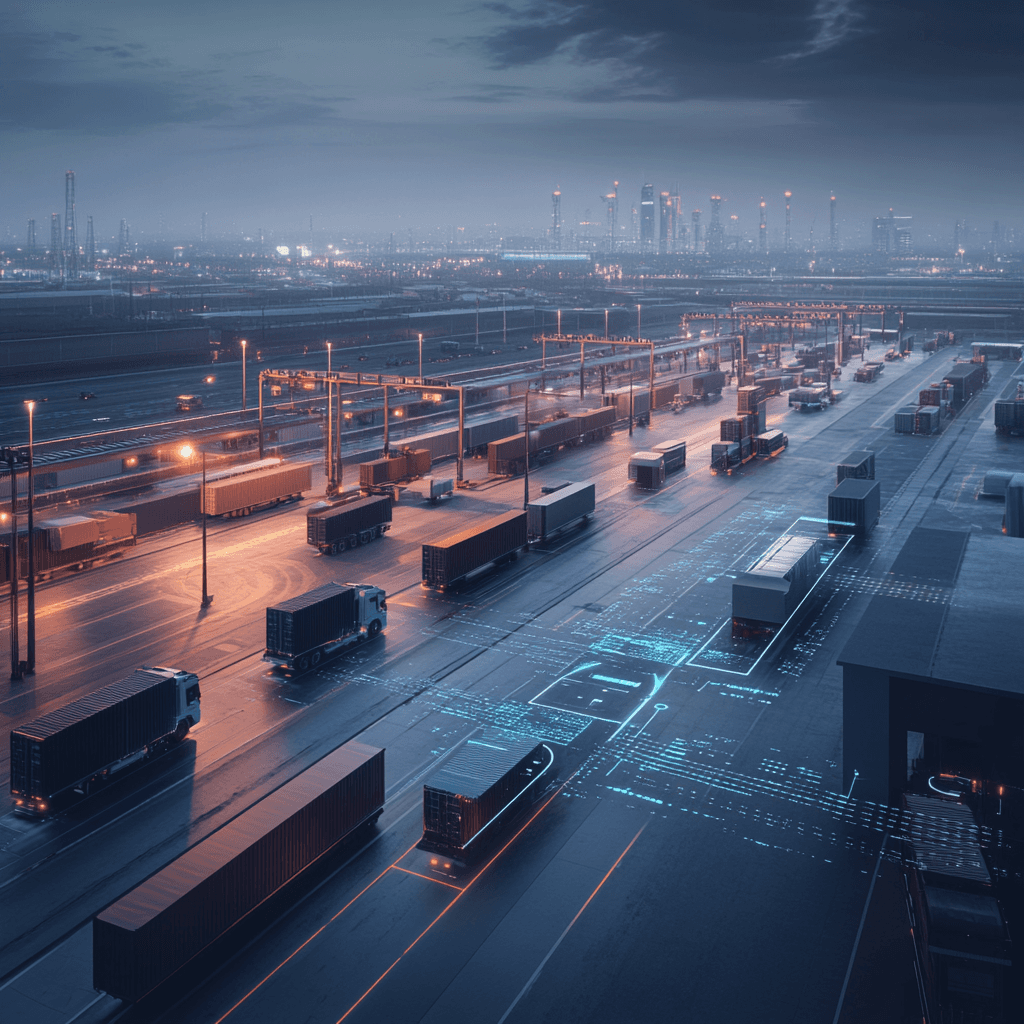
Insights
December 13, 2024
Autonomous Logistics Revolution: Suzuki and Applied AV Unveil Game-Changing Self-Driving Vehicle

Insights
December 13, 2024
Autonomous Logistics Revolution: Suzuki and Applied AV Unveil Game-Changing Self-Driving Vehicle
Explore how Suzuki and Applied AV's groundbreaking self-driving vehicle is poised to revolutionize the autonomous logistics landscape, reshaping supply chains and defining the future of transportation.
The global logistics industry stands at a pivotal crossroads, as emerging technologies like artificial intelligence, IoT-powered infrastructure, and autonomous vehicles converge to reshape traditional supply chain models. Among the latest groundbreaking developments comes the joint effort of Suzuki and Applied AV. Together, these two industry leaders have ushered in a new era of innovation with the launch of their state-of-the-art self-driving vehicle specifically designed for logistics and last-mile delivery. For transportation experts, supply chain executives, and logistics managers, this breakthrough carries significant implications that promise to transform the movement of goods on an unprecedented scale.
Suzuki, a name synonymous with dependable automotive engineering, has partnered with Applied AV, a leader in autonomous vehicle technologies, to address some of the industry’s biggest logistical challenges. Together, their collaboration has produced a cutting-edge, fully autonomous vehicle system designed not only to optimize processes but also to enhance sustainability and reduce costs. This development signals a major milestone in the quest for smarter supply chains.
At its core, this self-driving logistics solution represents a game-changer for delivery networks, warehouses, and transportation hubs alike. Utilizing Applied AV’s advanced autonomous technologies and Suzuki’s robust automotive frameworks, this vehicle delivers a synergy of precision engineering and next-generation robotics. The result is a seamless logistics experience that positions companies for greater efficiency in meeting the increasing demands of the e-commerce-driven economy.
The technology behind these autonomous systems is worth unpacking. Applied AV’s self-driving software integrates deep learning algorithms capable of making real-time decisions, even in the face of unstructured environments like busy urban streets or remote industrial sites. Coupled with Suzuki’s stringent manufacturing processes and vehicle durability standards, the platform ensures both safety and reliability. Sensors and advanced LIDAR systems map the environment in 3D, while onboard computation units process thousands of data points per second to create actionable insights that govern the vehicle’s path and speed. These vehicles are designed to interact not only with their surroundings but also with networked systems like dock management software, warehouse inventory platforms, and GPS logistics systems, creating a highly interconnected ecosystem of automation.
One of the most compelling features of the self-driving vehicle is its adaptability to address the complexities of last-mile delivery. Last-mile delivery has historically been one of the most expensive and environmentally taxing segments of the supply chain. Labor shortages, variable fuel costs, and urban congestion amplify these challenges. The Suzuki-Applied AV vehicle mitigates these factors through its fully electric drivetrain, near-zero emissions, and autonomous functionality. Costs are significantly reduced, not only by eliminating human driver expenses but also by optimizing delivery routes more effectively than human counterparts ever could.
Autonomous logistics is rapidly becoming a necessity amidst rising consumer expectations for same-day deliveries and an increasingly competitive global economy. For supply chain executives, adopting such advanced technologies is no longer optional but critical. Failure to adapt could widen operational inefficiencies and risk falling behind competitors that have embraced innovation. Suzuki’s move into this space acknowledges this growing urgency, ensuring their relevance in a future where AI and autonomy dominate logistics discussions.
From the lens of sustainability, the implications of this autonomous logistics solution are just as groundbreaking. Transportation costs stemming from fossil fuels account for a significant portion of supply chain CO2 emissions. By moving to an all-electric design, Suzuki underlines its commitment to reducing environmental impact while aligning with global policy shifts toward sustainable business operations. Furthermore, the vehicle’s AI-driven optimization minimizes waste by reducing unnecessary mileage—a win-win for both businesses and the planet.
The partnership between Suzuki and Applied AV also highlights a broader trend of collaboration between traditional automotive manufacturers and high-tech developers. Rather than competing, their joint venture showcases the strength of leveraging specialized expertise to solve complex industry problems. For Suzuki, this is much more than a product launch; it’s a strategic positioning to future-proof their market share by staying at the forefront of disruptive innovation. Applied AV, on the other hand, is building legitimacy by working alongside a globally recognized brand, giving its cutting-edge technologies commercial validation on a global stage.
As the vehicle begins pilot testing in controlled environments, industry observers are keen to see real-world data emerge. The ability to navigate dense urban landscapes, handle diverse terrain types, and integrate into existing logistics workflows will be crucial indicators of broader scalability. The focus is now on continuously improving machine learning algorithms so that vehicles can adapt to unexpected logistical events. Real-world deployment will determine if the promised efficiencies can scale effectively across different regions and industries.
For transportation and logistics managers, the implications are immense. Autonomous vehicles have the potential to reconfigure the architecture of current supply chains, altering everything from the locations of distribution centers to operational schedules. With 24/7 operational capabilities, these vehicles remove the limitations posed by human drivers, such as mandatory breaks or restricted working hours. This could result in radical changes to inventory turnover rates and logistics pipeline throughput, creating value beyond immediate cost reductions.
However, the rise of autonomous logistics vehicles also raises questions. How will these technologies impact the employment landscape? Logistics is one of the largest employers of human labor globally, and automation could potentially displace millions of workers. As an evolving industry, stakeholders must consider how to mitigate these risks through retraining programs and by creating new specialized roles in technology maintenance and oversight. Another emerging concern is cybersecurity. As vehicles become more interconnected with digital ecosystems, ensuring robust safeguards against hacking and data breaches will be critical.
For executives plotting their autonomous logistics strategies, viewing the Suzuki and Applied AV collaboration as a model could lead to actionable insights. For one, partnerships can be more effective in driving innovation than attempting to exclusively develop technology in-house. Furthermore, these developments highlight the importance of integrating systems rather than focusing solely on isolated vehicles. Supply chain modernization efforts will only succeed if the entire logistical network—from warehouse infrastructure to customer interfaces—functions cohesively with these vehicles.
The unveiling of this self-driving logistics vehicle comes at a crucial time when governments and private organizations are investing heavily in advancing autonomous mobility. Countries such as the USA, Japan, and Germany have been expanding smart transportation networks, test zones for autonomous fleets, and favorable regulatory frameworks. Suzuki and Applied AV benefit greatly from being at this nexus of innovation, blazing a trail for others in the industry to follow.
Looking forward, the adoption of autonomous logistics vehicles is likely to be driven by several key factors: consumer demand for faster deliveries, environmental regulations, technological advancements, and cost pressures. Companies that fail to recognize the value of such innovations risk becoming obsolete. For those ready to embrace the change, the potential for growth, profit, and sustainability is vast.
The Suzuki and Applied AV self-driving vehicle should be seen not only as a product but as a herald of what the next ten years could look like for the logistics and transportation industry. As autonomous technologies continue to evolve, the distance from concept to commonplace shortens significantly. The logistics experts of today have an opportunity to shape this transformation by strategically adopting and integrating emerging trends.
Whether you’re a decision-maker tasked with enhancing supply chain efficiency or a logistics leader interested in sustainability, the message is clear: The autonomous logistics revolution is happening now. Suzuki and Applied AV are paving the way with technology that has the potential to both reduce operating costs and create smarter, greener supply chains. The question is no longer if we will welcome autonomous logistics solutions, but how quickly businesses can adapt and reap the rewards of this groundbreaking innovation.
The global logistics industry stands at a pivotal crossroads, as emerging technologies like artificial intelligence, IoT-powered infrastructure, and autonomous vehicles converge to reshape traditional supply chain models. Among the latest groundbreaking developments comes the joint effort of Suzuki and Applied AV. Together, these two industry leaders have ushered in a new era of innovation with the launch of their state-of-the-art self-driving vehicle specifically designed for logistics and last-mile delivery. For transportation experts, supply chain executives, and logistics managers, this breakthrough carries significant implications that promise to transform the movement of goods on an unprecedented scale.
Suzuki, a name synonymous with dependable automotive engineering, has partnered with Applied AV, a leader in autonomous vehicle technologies, to address some of the industry’s biggest logistical challenges. Together, their collaboration has produced a cutting-edge, fully autonomous vehicle system designed not only to optimize processes but also to enhance sustainability and reduce costs. This development signals a major milestone in the quest for smarter supply chains.
At its core, this self-driving logistics solution represents a game-changer for delivery networks, warehouses, and transportation hubs alike. Utilizing Applied AV’s advanced autonomous technologies and Suzuki’s robust automotive frameworks, this vehicle delivers a synergy of precision engineering and next-generation robotics. The result is a seamless logistics experience that positions companies for greater efficiency in meeting the increasing demands of the e-commerce-driven economy.
The technology behind these autonomous systems is worth unpacking. Applied AV’s self-driving software integrates deep learning algorithms capable of making real-time decisions, even in the face of unstructured environments like busy urban streets or remote industrial sites. Coupled with Suzuki’s stringent manufacturing processes and vehicle durability standards, the platform ensures both safety and reliability. Sensors and advanced LIDAR systems map the environment in 3D, while onboard computation units process thousands of data points per second to create actionable insights that govern the vehicle’s path and speed. These vehicles are designed to interact not only with their surroundings but also with networked systems like dock management software, warehouse inventory platforms, and GPS logistics systems, creating a highly interconnected ecosystem of automation.
One of the most compelling features of the self-driving vehicle is its adaptability to address the complexities of last-mile delivery. Last-mile delivery has historically been one of the most expensive and environmentally taxing segments of the supply chain. Labor shortages, variable fuel costs, and urban congestion amplify these challenges. The Suzuki-Applied AV vehicle mitigates these factors through its fully electric drivetrain, near-zero emissions, and autonomous functionality. Costs are significantly reduced, not only by eliminating human driver expenses but also by optimizing delivery routes more effectively than human counterparts ever could.
Autonomous logistics is rapidly becoming a necessity amidst rising consumer expectations for same-day deliveries and an increasingly competitive global economy. For supply chain executives, adopting such advanced technologies is no longer optional but critical. Failure to adapt could widen operational inefficiencies and risk falling behind competitors that have embraced innovation. Suzuki’s move into this space acknowledges this growing urgency, ensuring their relevance in a future where AI and autonomy dominate logistics discussions.
From the lens of sustainability, the implications of this autonomous logistics solution are just as groundbreaking. Transportation costs stemming from fossil fuels account for a significant portion of supply chain CO2 emissions. By moving to an all-electric design, Suzuki underlines its commitment to reducing environmental impact while aligning with global policy shifts toward sustainable business operations. Furthermore, the vehicle’s AI-driven optimization minimizes waste by reducing unnecessary mileage—a win-win for both businesses and the planet.
The partnership between Suzuki and Applied AV also highlights a broader trend of collaboration between traditional automotive manufacturers and high-tech developers. Rather than competing, their joint venture showcases the strength of leveraging specialized expertise to solve complex industry problems. For Suzuki, this is much more than a product launch; it’s a strategic positioning to future-proof their market share by staying at the forefront of disruptive innovation. Applied AV, on the other hand, is building legitimacy by working alongside a globally recognized brand, giving its cutting-edge technologies commercial validation on a global stage.
As the vehicle begins pilot testing in controlled environments, industry observers are keen to see real-world data emerge. The ability to navigate dense urban landscapes, handle diverse terrain types, and integrate into existing logistics workflows will be crucial indicators of broader scalability. The focus is now on continuously improving machine learning algorithms so that vehicles can adapt to unexpected logistical events. Real-world deployment will determine if the promised efficiencies can scale effectively across different regions and industries.
For transportation and logistics managers, the implications are immense. Autonomous vehicles have the potential to reconfigure the architecture of current supply chains, altering everything from the locations of distribution centers to operational schedules. With 24/7 operational capabilities, these vehicles remove the limitations posed by human drivers, such as mandatory breaks or restricted working hours. This could result in radical changes to inventory turnover rates and logistics pipeline throughput, creating value beyond immediate cost reductions.
However, the rise of autonomous logistics vehicles also raises questions. How will these technologies impact the employment landscape? Logistics is one of the largest employers of human labor globally, and automation could potentially displace millions of workers. As an evolving industry, stakeholders must consider how to mitigate these risks through retraining programs and by creating new specialized roles in technology maintenance and oversight. Another emerging concern is cybersecurity. As vehicles become more interconnected with digital ecosystems, ensuring robust safeguards against hacking and data breaches will be critical.
For executives plotting their autonomous logistics strategies, viewing the Suzuki and Applied AV collaboration as a model could lead to actionable insights. For one, partnerships can be more effective in driving innovation than attempting to exclusively develop technology in-house. Furthermore, these developments highlight the importance of integrating systems rather than focusing solely on isolated vehicles. Supply chain modernization efforts will only succeed if the entire logistical network—from warehouse infrastructure to customer interfaces—functions cohesively with these vehicles.
The unveiling of this self-driving logistics vehicle comes at a crucial time when governments and private organizations are investing heavily in advancing autonomous mobility. Countries such as the USA, Japan, and Germany have been expanding smart transportation networks, test zones for autonomous fleets, and favorable regulatory frameworks. Suzuki and Applied AV benefit greatly from being at this nexus of innovation, blazing a trail for others in the industry to follow.
Looking forward, the adoption of autonomous logistics vehicles is likely to be driven by several key factors: consumer demand for faster deliveries, environmental regulations, technological advancements, and cost pressures. Companies that fail to recognize the value of such innovations risk becoming obsolete. For those ready to embrace the change, the potential for growth, profit, and sustainability is vast.
The Suzuki and Applied AV self-driving vehicle should be seen not only as a product but as a herald of what the next ten years could look like for the logistics and transportation industry. As autonomous technologies continue to evolve, the distance from concept to commonplace shortens significantly. The logistics experts of today have an opportunity to shape this transformation by strategically adopting and integrating emerging trends.
Whether you’re a decision-maker tasked with enhancing supply chain efficiency or a logistics leader interested in sustainability, the message is clear: The autonomous logistics revolution is happening now. Suzuki and Applied AV are paving the way with technology that has the potential to both reduce operating costs and create smarter, greener supply chains. The question is no longer if we will welcome autonomous logistics solutions, but how quickly businesses can adapt and reap the rewards of this groundbreaking innovation.
Explore how Suzuki and Applied AV's groundbreaking self-driving vehicle is poised to revolutionize the autonomous logistics landscape, reshaping supply chains and defining the future of transportation.
The global logistics industry stands at a pivotal crossroads, as emerging technologies like artificial intelligence, IoT-powered infrastructure, and autonomous vehicles converge to reshape traditional supply chain models. Among the latest groundbreaking developments comes the joint effort of Suzuki and Applied AV. Together, these two industry leaders have ushered in a new era of innovation with the launch of their state-of-the-art self-driving vehicle specifically designed for logistics and last-mile delivery. For transportation experts, supply chain executives, and logistics managers, this breakthrough carries significant implications that promise to transform the movement of goods on an unprecedented scale.
Suzuki, a name synonymous with dependable automotive engineering, has partnered with Applied AV, a leader in autonomous vehicle technologies, to address some of the industry’s biggest logistical challenges. Together, their collaboration has produced a cutting-edge, fully autonomous vehicle system designed not only to optimize processes but also to enhance sustainability and reduce costs. This development signals a major milestone in the quest for smarter supply chains.
At its core, this self-driving logistics solution represents a game-changer for delivery networks, warehouses, and transportation hubs alike. Utilizing Applied AV’s advanced autonomous technologies and Suzuki’s robust automotive frameworks, this vehicle delivers a synergy of precision engineering and next-generation robotics. The result is a seamless logistics experience that positions companies for greater efficiency in meeting the increasing demands of the e-commerce-driven economy.
The technology behind these autonomous systems is worth unpacking. Applied AV’s self-driving software integrates deep learning algorithms capable of making real-time decisions, even in the face of unstructured environments like busy urban streets or remote industrial sites. Coupled with Suzuki’s stringent manufacturing processes and vehicle durability standards, the platform ensures both safety and reliability. Sensors and advanced LIDAR systems map the environment in 3D, while onboard computation units process thousands of data points per second to create actionable insights that govern the vehicle’s path and speed. These vehicles are designed to interact not only with their surroundings but also with networked systems like dock management software, warehouse inventory platforms, and GPS logistics systems, creating a highly interconnected ecosystem of automation.
One of the most compelling features of the self-driving vehicle is its adaptability to address the complexities of last-mile delivery. Last-mile delivery has historically been one of the most expensive and environmentally taxing segments of the supply chain. Labor shortages, variable fuel costs, and urban congestion amplify these challenges. The Suzuki-Applied AV vehicle mitigates these factors through its fully electric drivetrain, near-zero emissions, and autonomous functionality. Costs are significantly reduced, not only by eliminating human driver expenses but also by optimizing delivery routes more effectively than human counterparts ever could.
Autonomous logistics is rapidly becoming a necessity amidst rising consumer expectations for same-day deliveries and an increasingly competitive global economy. For supply chain executives, adopting such advanced technologies is no longer optional but critical. Failure to adapt could widen operational inefficiencies and risk falling behind competitors that have embraced innovation. Suzuki’s move into this space acknowledges this growing urgency, ensuring their relevance in a future where AI and autonomy dominate logistics discussions.
From the lens of sustainability, the implications of this autonomous logistics solution are just as groundbreaking. Transportation costs stemming from fossil fuels account for a significant portion of supply chain CO2 emissions. By moving to an all-electric design, Suzuki underlines its commitment to reducing environmental impact while aligning with global policy shifts toward sustainable business operations. Furthermore, the vehicle’s AI-driven optimization minimizes waste by reducing unnecessary mileage—a win-win for both businesses and the planet.
The partnership between Suzuki and Applied AV also highlights a broader trend of collaboration between traditional automotive manufacturers and high-tech developers. Rather than competing, their joint venture showcases the strength of leveraging specialized expertise to solve complex industry problems. For Suzuki, this is much more than a product launch; it’s a strategic positioning to future-proof their market share by staying at the forefront of disruptive innovation. Applied AV, on the other hand, is building legitimacy by working alongside a globally recognized brand, giving its cutting-edge technologies commercial validation on a global stage.
As the vehicle begins pilot testing in controlled environments, industry observers are keen to see real-world data emerge. The ability to navigate dense urban landscapes, handle diverse terrain types, and integrate into existing logistics workflows will be crucial indicators of broader scalability. The focus is now on continuously improving machine learning algorithms so that vehicles can adapt to unexpected logistical events. Real-world deployment will determine if the promised efficiencies can scale effectively across different regions and industries.
For transportation and logistics managers, the implications are immense. Autonomous vehicles have the potential to reconfigure the architecture of current supply chains, altering everything from the locations of distribution centers to operational schedules. With 24/7 operational capabilities, these vehicles remove the limitations posed by human drivers, such as mandatory breaks or restricted working hours. This could result in radical changes to inventory turnover rates and logistics pipeline throughput, creating value beyond immediate cost reductions.
However, the rise of autonomous logistics vehicles also raises questions. How will these technologies impact the employment landscape? Logistics is one of the largest employers of human labor globally, and automation could potentially displace millions of workers. As an evolving industry, stakeholders must consider how to mitigate these risks through retraining programs and by creating new specialized roles in technology maintenance and oversight. Another emerging concern is cybersecurity. As vehicles become more interconnected with digital ecosystems, ensuring robust safeguards against hacking and data breaches will be critical.
For executives plotting their autonomous logistics strategies, viewing the Suzuki and Applied AV collaboration as a model could lead to actionable insights. For one, partnerships can be more effective in driving innovation than attempting to exclusively develop technology in-house. Furthermore, these developments highlight the importance of integrating systems rather than focusing solely on isolated vehicles. Supply chain modernization efforts will only succeed if the entire logistical network—from warehouse infrastructure to customer interfaces—functions cohesively with these vehicles.
The unveiling of this self-driving logistics vehicle comes at a crucial time when governments and private organizations are investing heavily in advancing autonomous mobility. Countries such as the USA, Japan, and Germany have been expanding smart transportation networks, test zones for autonomous fleets, and favorable regulatory frameworks. Suzuki and Applied AV benefit greatly from being at this nexus of innovation, blazing a trail for others in the industry to follow.
Looking forward, the adoption of autonomous logistics vehicles is likely to be driven by several key factors: consumer demand for faster deliveries, environmental regulations, technological advancements, and cost pressures. Companies that fail to recognize the value of such innovations risk becoming obsolete. For those ready to embrace the change, the potential for growth, profit, and sustainability is vast.
The Suzuki and Applied AV self-driving vehicle should be seen not only as a product but as a herald of what the next ten years could look like for the logistics and transportation industry. As autonomous technologies continue to evolve, the distance from concept to commonplace shortens significantly. The logistics experts of today have an opportunity to shape this transformation by strategically adopting and integrating emerging trends.
Whether you’re a decision-maker tasked with enhancing supply chain efficiency or a logistics leader interested in sustainability, the message is clear: The autonomous logistics revolution is happening now. Suzuki and Applied AV are paving the way with technology that has the potential to both reduce operating costs and create smarter, greener supply chains. The question is no longer if we will welcome autonomous logistics solutions, but how quickly businesses can adapt and reap the rewards of this groundbreaking innovation.
Other Blogs
Other Blogs
Check our other project Blogs with useful insight and information for your businesses
Other Blogs
Other Blogs
Check our other project Blogs with useful insight and information for your businesses
Other Blogs
Other Blogs
Check our other project Blogs with useful insight and information for your businesses


